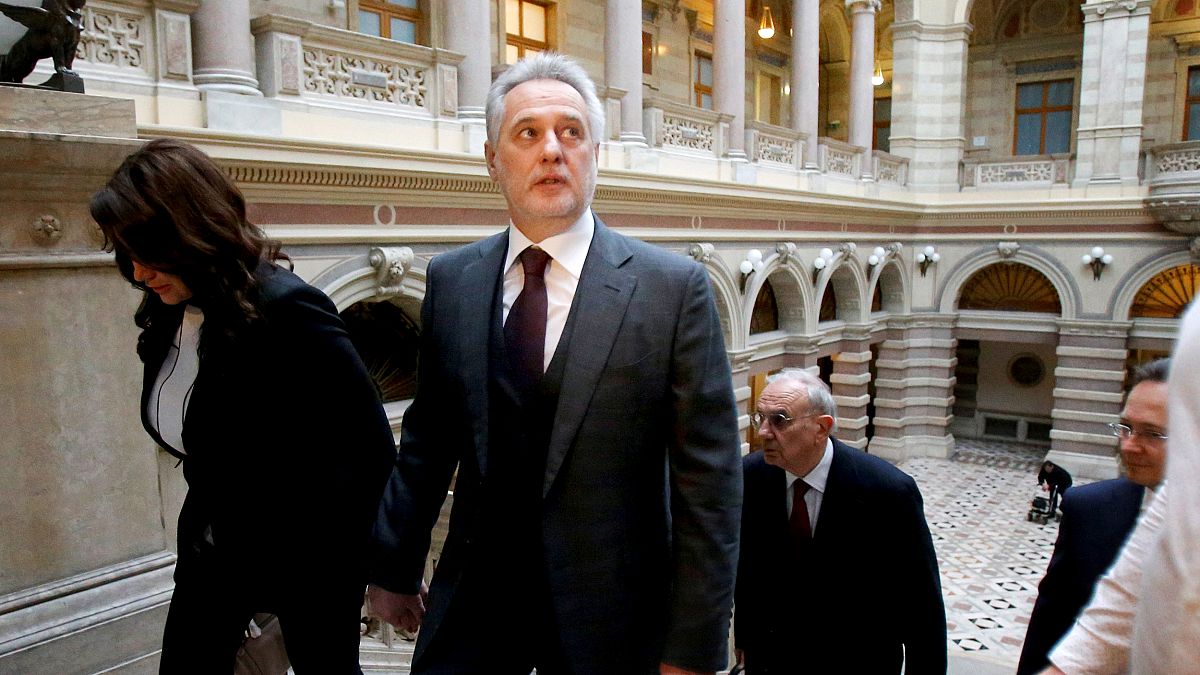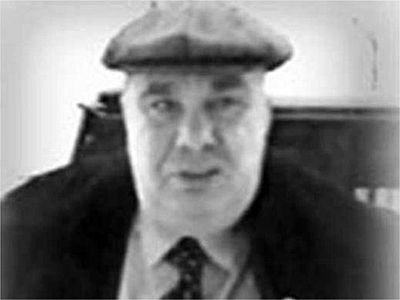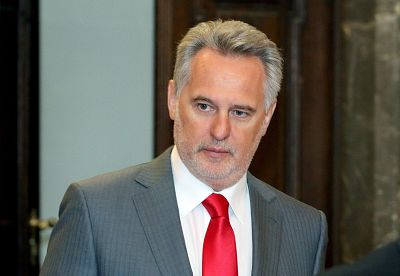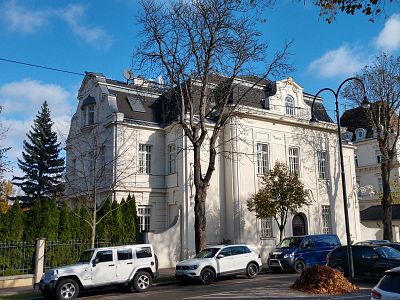The billionaire oligarch is "at the dead center of the greatest corruption operation in Ukraine's history," said a former senior U.S. diplomat.
In September, one month before Lev Parnas was indicted on campaign finance charges, his wife received wire transfers from a bank account in Russia.
The sum was $1 million, and the source was a lawyer for Dmytro Firtash, according to a court filing by U.S. prosecutors.
Firtash, a Ukrainian oligarch who made a fortune in the natural gas trade, is perhaps the most enigmatic figure in the scandal that has played a key role in President Donald Trump's impeachment.
A billionaire with alleged ties to the Russian mob, Firtash is facing bribery-related charges in the U.S. and fighting extradition from Vienna. He once attempted to buy and redevelop the famous Drake Hotel in New York with the now-incarcerated Paul Manafort, Donald Trump's former campaign chairman. And he's seen by Ukrainian anti-corruption activists and Western governments as a corrupt instrument of Russia.
Exactly why the money was sent to the wife of Parnas — the former Trump donor and Rudy Giuliani associate who has since turned on the president — is unclear. But Firtash provided key documents that Giuliani used to further his discredited claim that former Vice President Joe Biden engaged in wrongdoing in Ukraine.
Questions over Firtash's alleged role in the effort to smear Biden deepened last week when Parnas said the oligarch's involvement stemmed from an explicit quid pro quo. In exchange for Firtash's help in their effort to damage Biden, Parnas told MSNBC's Rachel Maddow, he assured the oligarch they would make his U.S. legal troubles disappear.
"For us to be able to receive information from Firtash, we had to promise Firtash something," Parnas said. "So for Firtash, it was basically telling him that we knew his case was worthless here and that he's being prosecuted for no reason. And that basically, it could get taken care of."
In other words, according to Parnas: Guiliani, the former New York City mayor who made his name putting mob figures in prison as a U.S. attorney, was so eager to help Trump and hurt Biden that he turned to a man Ukrainian activists call their country's most dangerous oligarch — and offered the equivalent of a get-out-of-jail-free card.
"Some folks might wonder what Mr. Giuliani was thinking. The better question is whether he was thinking," said Chuck Rosenberg, a former federal prosecutor and senior FBI official and now an analyst with NBC News and MSNBC. "This is so foolhardy and so reckless, that it is difficult to fathom what he was doing or how he thought it could succeed."
Firtash lived up to his end of the alleged bargain: His lawyers provided a now-discredited affidavit from a Ukrainian prosecutor accusing Biden of wrongdoing. But Giuliani's team did not deliver.
According to Parnas and a senior U.S. official, Firtash's lawyers, Giuliani associates Joe DiGenova and Victoria Toensing, were unable to convince Attorney General William Barr to intervene in the Firtash case.
The alleged scheme, one former U.S. official told NBC News, was stunning in its audacity.
"Think of it this way," said the official, who has deep knowledge of Ukraine's politics and Firtash's history. "You have the president's personal lawyer trying to get the president's official lawyer, the attorney general, to get the Justice Department to drop charges against an oligarch supported by Russia. That's what was happening."
Asked for comment about the alleged deal with Firtash, Giuliani offered a two-word reply.
"Absolutely untrue," he said in a text message, without elaborating. Giuliani has previously denied directing Parnas to work with Firtash.
Representatives for Firtash declined to comment and instead referred NBC News to an interview he gave to The New York Times in November. In the interview, Firtash said he hired DiGenova and Toensing to help with his legal problems, but he didn't fund the effort to dig up dirt on Biden and had no information about him.
"Without my will and desire, I was sucked into this internal U.S. fight," Firtash told The Times.
A spokesman for Toensing and diGenova, who are married, pushed back against the allegation that they were working in partnership with Parnas.
"The claim by Mr. Parnas is absolutely false," the spokesman, Mark Corallo, said. "Ms. Toensing and Mr. diGenova made a strictly legal and factual presentation before the Justice Department, arguing that a person who has never been to the United States cannot be indicted under the [Foreign Corrupt Practices Act]."
Giuliani has relied on a questionable cast of figures in his efforts to tarnish Biden and damage the Democratic case for impeachment. But Firtash stands out for his fabulous wealth, his alleged links to Russian organized crime figures and his reputation for diverting natural gas profits to pro-Russian politicians in Ukraine.
"Firtash is at the dead center of the greatest corruption operation in Ukraine's history," said a former senior U.S. diplomat who served in the region. "He managed the flow of natural gas from Russia to Ukraine and beyond and it kept Ukraine dependent on Russia's gas supplies."
Anders Aslund, a former Swedish diplomat who has studied Ukraine's economy for years, said Firtash is more of a purveyor of bribes than a proper businessman.
"He has essentially been used by the Russians to buy political power in Ukraine," said Aslund, now a senior fellow at the Atlantic Council think tank. "He's the person who has spent the most money on behalf of the Kremlin on Ukraine's politicians."
Almost a fireman
The son of middle-class parents, Dmytro Vasylovych Firtash, 54, served in the Soviet army from 1984 to 1986, according to U.S. government documents.
After the Soviet Union collapsed, he considered becoming a fireman, Firtash told the U.S. ambassador to Ukraine in 2008 — but opted to start a dry milk and cannery company.
According to diplomatic cables made public by WikiLeaks, Firtash told American diplomats that he came to know powerful Russian businessmen through his commodities business, which led him to launch a company that would become a huge player in the Central Asian natural gas market.
Firtash and a partner formed EuroTransGas company in 2002 and began making deals with central Asian countries. Some of those deals took business away from a powerful oligarch, Igor Makarov.
Makarov — now under American sanctions — had dangerous connections.
In January 2002, according to the State Department cables, Firtash was summoned to a meeting. He told embassy officials in Kyiv he feared for his life.
"He went to that dinner not knowing if he would be beaten up or even killed for having taken Makarov's business from him," one State Department cable says.
Makarov brought along his head of security, a man named Semion Mogilevich, who was one of the world's most feared Russian mobsters, according to U.S. law enforcement officials.
Firtash emerged from the meeting unscathed and "credited his ability to keep his life and his gas business to his good reputation among Central Asian leaders," the State Department cable says.
Later, meeting with the American ambassador in Ukraine, Firtash was asked about his connections to Mogilevich, who once had a spot on the FBI's Most Wanted list.
Organized crime: A fact of life
In essence, Firtash answered: It's complicated.
"Firtash acknowledged that he needed, and received, permission from Mogilevich when he established various businesses, but he denied any close relationship to him," the cable says.
If you wanted to do business in Ukraine in the early 2000s — Firtash told the Americans, according to State Department cables — you had to get along with Russian organized crime figures.
"It was impossible to approach a government official for any reason without also meeting with an organized crime member at the same time," one cable says Firtash told the Americans.
With the mob's help, it turned out, it was possible to grow very, very rich.
Firtash made a series of lucrative gas deals from 2004 to 2008 through a company called RosUkrEnergo, according to State Department cables and Firtash's own website.
According to the cables, Firtash teamed up with crime figure Mogilevich and a man named Ivan Fursin for a combined 50 percent stake in RosUkrEnergo. The other half was owned by Gazprom, the Kremlin-backed Russian gas company.
Firtash, according to anti-corruption activists and former U.S. officials, was Putin's man in the Ukrainian gas industry, an extraordinarily lucrative position.
But after Ukraine's Orange Revolution deposed its pro-Russian leaders in 2014, the new government struck a deal on natural gas, depriving Firtash of a major revenue stream.
"Basically, he lost his big money-making machine" and "he could no longer dominate the gas trade," said Aslund, of the Atlantic Council.
Under reform-minded management, Ukraine's state-owned energy company, Naftogaz, gradually dismantled much of the corrupt arrangements that had enriched Firtash.
At the same time, the oligarch faced serious legal trouble from U.S. authorities.
Indicted in Chicago
In 2013, as the Obama administration was pushing an anti-corruption agenda in Ukraine, federal prosecutors in Chicago indicted Firtash, charging him with a scheme to bribe Indian officials to obtain a lucrative mining deal to sell titanium to Boeing for the 787 Dreamliner.
Prosecutors say Firtash paid off local officials in a titanium-rich section of southern India in order to secure mining licenses and sustain an enterprise expected to generate more than $500 million annually.
He was arrested in Vienna in March 2014, released on $174 million bail and has been contesting his extradition to the U.S. ever since.
A July 2016 filing in the case said the Justice Department had identified Firtash as an "upper-echelon [associate] of Russian organized crime."
His prosecution "will disrupt this organized crime group and prevent it from taking further criminal acts within the United States," it added.
The $174 million bail — said to be the largest in Austrian history — was paid by the Russian billionaire Vasily Anisimov, who is also under U.S. sanctions.
In Vienna, Firtash lives in a posh villa boasting a lap pool, wine cellar and home theater. A black steel gate, at least 7-feet tall, blocks his driveway. Whenever he leaves the property, a Mercedes SUV pulls out first to block the one-way street leading to his home. Then Firtash's jet black Mercedes Maybach rolls out of the premises. His burly security guards hop in the SUV and it takes off closely trailing Firtash's vehicle.
At no point during the choreographed exit is Firtash visible.
To fight the Chicago case during the Obama administration, Firtash hired a well-known Chicago trial lawyer, Dan Webb, and a well-connected Democrat in Washington, Lanny Davis.
But in June, Firtash told The New York Times, he was approached by Parnas and his associate, Lev Fruman, who had been working with Giuliani in an effort to dig up dirt on Biden in Ukraine. Technically, Parnas and Fruman were part of Trump's legal team, their lawyers have said in federal court.
In the interview with the Times, Firtash said Parnas and Fruman told him they could help with his Justice Department problems, as long as he hired Toensing and diGenova. Parnas confirmed that account to Maddow. Firtash hired the husband-wife legal team, and he told the Times he paid his new lawyers $1.2 million.
In late August, according to a senior U.S. official with direct knowledge, Toensing and diGenova went to the Justice Department and pleaded Firtash's case with the attorney general. But Barr declined to intervene, the official said.
Two senior law enforcement officials say that federal prosecutors in New York and Chicago have shared notes on Firtash and Parnas since Parnas' indictment.
Firtash's extradition case remains mired in the Austrian legal system. The country's justice minister approved the extradition request last summer, but Firtash's lawyers immediately filed a court motion, putting any action on hold.
An affidavit emerges
In September, right-wing media began to report onan affidavit from a fired Ukrainian prosecutor, Viktor Shokin, that Giuliani and other Trump allies have used as a basis to accuse Biden of corruption. Shokin is the prosecutor whom Biden, when he was vice president, urged be removed, in keeping with U.S. policy at the time that viewed Shokin as a bad actor.
The affidavit was featured in a Trump campaign ad attacking Biden and the House impeachment inquiry.
The language was unusual. Shokin did not have direct evidence for his allegations. He said he "assumed" that Biden was supporting the Ukrainian gas company Burisma because his son was on the board.
The affidavit was sworn, it says on the first page, "at the request of lawyers acting for Dmitry Firtash ('DF'), for use in legal proceedings in Austria."
In October, Parnas and Fruman were arrested oncharges of funneling money from foreign entities to U.S. candidates in a scheme to buy political influence. They have pleaded not guilty.
Since then, NBC News has reported thatParnas and Fruman were advocating on Firtash's behalf as they pitched a natural gas deal to an official of Ukraine's gas company, according to an American executive briefed on the meeting. The scheme called for sacking the management of the company, which would have eliminated an arch-foe for Firtash and opened the door to him reasserting his dominance of the industry.
At a meeting in Houston last March, Parnas and Fruman mentioned Firtash as they made a proposal to an official of Ukraine's natural gas company, according to Dale Perry, an American gas executive who does business in Ukraine and was briefed on the meeting. Perry told NBC News the pair was urging that the gas company pay Firtash a debt of more than $200 million that Firtash claims he is owed by the company.
Parnas visited Firtash a number of times, according to court filings by prosecutors, who say Parnas got $200,000 in payments from diGenova and Toensing for translation services.
Prosecutors also revealed for the first time the $1 million wire fund transfer from a Russian bank account to Parnas' wife, saying the money came from one of Firtash's attorneys, Ralph Oswald Isenegger.
Isenegger has said the money belonged to him and was given to the Parnases as a loan for the purchase of a new home. Isenegger agreed to the five-year loan without Parnas having to post any collateral, according to an email Isenegger sent to Parnas' wife a month before his arrest.
Parnas' attorney, Joseph Bondy, told the court the money was used for security, legal bills and other expenses. NBC News has reviewed a partially redacted copy of Svetlana Parnas' bank account which showed a balance of only $95,000 after the $1 million deposit— with nearly $160,000 in private jet bills and $400,000 in outgoing wire fund transfers or bank withdrawals. No details were available on the remaining $440,000.
Parnas' attorney did not respond to a request about the specifics of the remaining $440,000 or why the payment wasn't made to Parnas directly if it was for plane expenses.
On Dec. 16, Isenegger wrote to Svetlana asking for the immediate return of the money despite it being a five-year loan, noting that her husband's arrest was "on the front page of all media," according to a copy of the email filed to the court.
The former U.S. official familiar with Firtash's dealings said he understood why the oligarch would have pursued a deal with Parnas and Giuliani.
"Firtash is an opportunist, and he saw an opportunity," the former official said.
The arrangement offered Firtash the chance to get rid of his U.S. legal problems and remove the leadership of the state energy company Naftogaz that had undermined his money-making schemes—without having to make any major sacrifices of his own, the former official said.
"It was a good deal," the former official added. "But it didn't work out."



